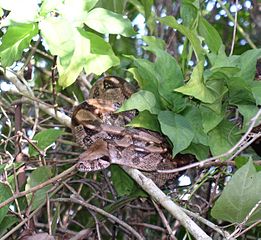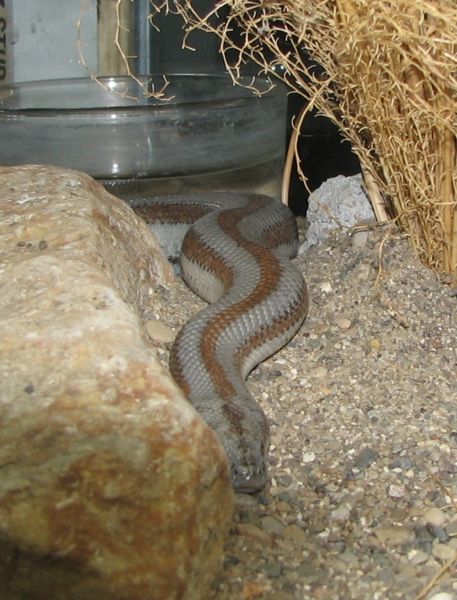Garter Snakes (Thamnophis ssp.) have long introduced aspiring herpetologists to snake-keeping and remain popular today. A number of North America’s 30+ species are regularly available in the pet trade, and they remain the most commonly encountered free-living snakes in most areas. Although often thought of as “beginner’s snakes”, I maintain that garters possess a unique combination of characteristics that render them fascinating additions to any private or public collection…they certainly have been a source of many of my most interesting observations.
Range
 Garter Snakes of one or another species range from southern Canada to Central America, and reach their greatest diversity in the United States.
Garter Snakes of one or another species range from southern Canada to Central America, and reach their greatest diversity in the United States.
Those best suited to captivity are classified in the genus Thamnophis. Along with ribbon and water snakes, this genus is placed within the subfamily Natricinae and the family Colubridae.
Diet
Frogs, tadpoles, earthworms, salamanders, fishes and insects comprise the diets of most species. Several are immune to the virulent skin toxins of amphibians such as California newts, which have caused human fatalities when ingested, and toxin-protected American toads are the primary food of plains garter snakes (T. radix) and others. Some, such as the giant garter snake (T. couchi gigs), take rodents on occasion.
Attractive Attributes
A preference for fishes and earthworms, and a willingness to accept nonliving food items (garters sometimes consume road-killed frogs) greatly simplifies garter snake husbandry, and suits them well to those who prefer not to keep rodent-eating snakes.
All bear live young and, when properly maintained, are likely to breed. Although wild-caught snakes will bite and release musk when handled, they tame down readily…the most frequently kept species, the common garter snake (T. sirtalis), is especially docile.
Eliciting Natural Behavior
What I especially favor about garter snakes is that they can be kept in planted, naturalistic terrariums – a difficult prospect where most other snakes are concerned.
When kept so they reveal a great many of their natural behaviors – far more than is the case for large snakes maintained in bare enclosures. A pair of garter snakes in a terrarium stocked with plants, branches, hideaways and a pool will provide you with insights into snake behavior that are not easy to come by otherwise.
A Wide Spectrum of Colors
While not subject to the intensive captive breeding efforts applied to other species, garter snakes are being kept by several breeders interested in developing unique color morphs. Already, some spectacular results have been achieved, and more can be expected.
This is not to say that selective breeding is necessary where garter snake colors are involved. All are interestingly marked, and a great many species sport bright colors. In fact, a subspecies of the common garter, known as the San Francisco garter snake (T. sirtalis tetrataenia), is one of the most beautiful snakes to be found anywhere. Unfortunately, it is highly endangered and may not be kept in the USA, but by all means try to see it in zoo collection if possible.
Individual variation among animals of the same species is the rule when it comes to garter snakes, so all sorts of interesting surprises await those who seek out these most fascinating reptiles.
Further Reading
Please see my article Keeping Snakes in Naturalistic Terrariums for some ideas concerning planted habitats for garter snakes.
Texas Garter Snake image referenced from wikipedia and originally posted by Dawson
 That Reptile Blog – Reptile, Amphibian and Exotic Pet Care and Information
That Reptile Blog – Reptile, Amphibian and Exotic Pet Care and Information


